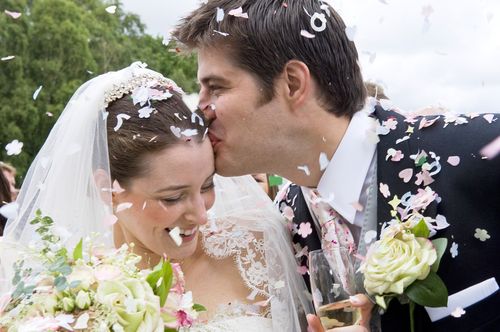 You have found the woman of your dreams. You bought the engagement ring, planned the proposal, dropped to one knee, and somehow convinced her to marry you. Now what? If you're like many guys, you probably spent more time thinking about the ring, how you would make the proposal memorable, and how wonderful the honeymoon would be than you did the details of the wedding itself.
You have found the woman of your dreams. You bought the engagement ring, planned the proposal, dropped to one knee, and somehow convinced her to marry you. Now what? If you're like many guys, you probably spent more time thinking about the ring, how you would make the proposal memorable, and how wonderful the honeymoon would be than you did the details of the wedding itself.
Planning a wedding can be daunting, and this can be a stressful time in a relationship. But fear not — these few tips can give you the edge you need to survive even the most stressful aspects of wedding planning.
The Mindset
The most important thing to remember is that the wedding planning process may significantly impact your relationship with your fiancé and future wife. Therefore, it would be best if you aimed to make the planning process something that strengthens your connection. Search for ways to help ease your partner's burden by being supportive and actively searching for ways to get involved.
Be prepared to give meaningful input when requested, which may mean giving opinions on things you don't feel strongly about. Your fiancé will likely make many decisions throughout this process, but sometimes she may need you to make some for her. On the flip side, you should choose your battles wisely. Before going to war over an issue, take a moment to evaluate whether this concern is worth the fight. Are you sure that you need chrysanthemums, or is that a decision where you can find a compromise?
The Essentials
You will need to discuss some wedding details with your fiancé early on. Two of these logistical details are the wedding date and the budget. First, you and your fiancé will need to determine when the wedding will occur. Are you looking for a long engagement or a short one? If you are looking for a short engagement period, consult with family and friends to ensure there are no scheduling conflicts.
You will also need to figure out the budget for the wedding. Traditionally, the bride covers the cost of the wedding, but it is becoming more common for the groom or his family to assist or entirely pay for it. The planning will require that you provide input on these issues.
The Bridal Party
In most weddings, the groom selects the groomsmen and the bride chooses the bridesmaids. Typically, the bride will include the groom's sisters if he wishes, and vice versa for the groom. The two of you can decide together who the ring bearer and flower girl will be.
It might be an easy decision if one of you has a young niece, nephew, or cousin. If there are multiple small children in both of your families, feel free to have more than one flower girl or ring bearer.
Your Responsibility
Only you and your fiancé can determine what roles you each will play in the wedding planning process. Traditionally, the groom plans and pays for the honeymoon. Of course, you will want to discuss the honeymoon with your fiancé, but some grooms keep with the tradition of the honeymoon details being a surprise to the bride.
Regardless of whether you jointly decide that the honeymoon is a surprise, some brides may feel that it would help if you planned on being ultimately responsible for the honeymoon. Removing the planning details for the honeymoon from your bride's plate can help reduce the planning burden she is already facing. Additionally, the groom is traditionally responsible for funding the rehearsal dinner.
Wedding planning can be stressful, and many grooms don't know their role. However, if you follow these tips, you can help make the wedding planning process more enjoyable and less stressful for you and your future spouse.